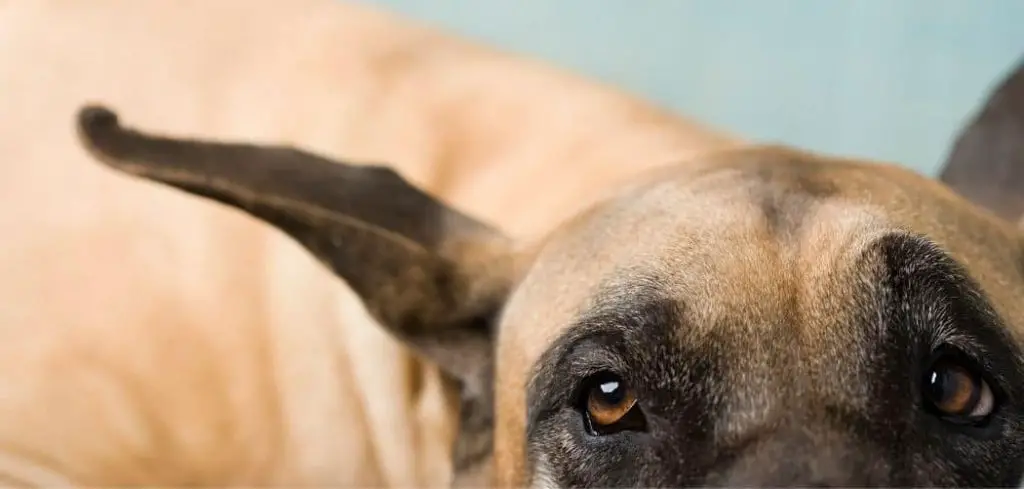Seeing your dog pass slimy diarrhea can be alarming, messy, and worrying for any dog owner. This symptom often indicates digestive upset or an underlying health issue that needs attention.
We outline the common causes of a dog pooping slimy diarrhea, what you can do at home, and when to seek veterinary help.
Dog Pooping Slimy Diarrhea — Why It Happens
Slimy diarrhea in dogs is usually caused by inflammation or irritation of the intestines, which leads to excess mucus in the stool. This can result from infections, dietary indiscretion, parasites, or chronic conditions affecting the gut.
Some dogs may show mild symptoms occasionally, while others experience persistent slime in their stool alongside vomiting, lethargy, or loss of appetite.
Stress, sudden diet changes, or gastrointestinal disorders can also make a dog produce slimy diarrhea, particularly if the intestinal lining is sensitive.

Dog Pooping Slimy Diarrhea: Common Causes
1. Dietary Indiscretion
Dogs are natural scavengers, and eating something inappropriate like garbage, spoiled food, or foreign objects can irritate the gut lining.
This irritation triggers mucus production, which mixes with the stool, producing slimy diarrhea.
You may notice their dog acting restless, straining in the yard, or showing mild discomfort. While occasional indiscretion can be managed at home, repeated episodes require veterinary evaluation to rule out blockages or chronic digestive sensitivity.
Read more: Dog Pooping Yellow Diarrhea (Learn what it means for your dog)
2. Food Intolerance or Sudden Diet Change
Switching your dog’s food too quickly or feeding ingredients they’re sensitive to can upset the intestinal balance.
This leads to inflammation of the colon, triggering mucus secretion and resulting in slimy diarrhea.
You may notice soft stools, occasional gas, or mild stomach cramping. Feeding a new food gradually over 7–10 days helps prevent this response, and a bland diet can soothe the digestive tract while the gut microbiome adjusts.
3. Stress and Anxiety
Stress can impact a dog’s gut just as it does in humans.
Separation, loud noises, or a new environment can cause intestinal inflammation, leading to mucus in the stool.
Slimy diarrhea related to stress is often intermittent and may coincide with other signs of anxiety, such as pacing, whining, or restlessness. Managing a calm environment and consistent routine can help reduce these episodes.
4. Intestinal Parasites
Parasites like giardia, hookworms, or whipworms are common culprits of slimy diarrhea in dogs.
Parasites damage the intestinal lining and stimulate mucus production, resulting in soft, slimy stools.
You may notice other symptoms such as weight loss, dull coat, or increased appetite with poor weight gain. Puppies, dogs that spend time outdoors, or dogs in multi-pet households are at higher risk. Fecal testing and timely deworming are essential for treatment and prevention.
5. Bacterial or Viral Infections
Bacteria like Clostridium, Salmonella, and viruses such as parvovirus can cause acute intestinal inflammation.
The intestines respond by secreting extra mucus, producing slimy, sometimes watery diarrhea. Dogs may also vomit, appear lethargic, or develop a fever. Because these infections can progress rapidly, immediate veterinary evaluation is often necessary.
Early treatment with hydration, supportive care, and, in some cases, antibiotics or antivirals is key to recovery.
6. Inflammatory Bowel Disease (IBD)
IBD is a chronic condition where a dog’s immune system attacks its intestinal lining, causing persistent inflammation.
This results in recurring bouts of slimy diarrhea, sometimes accompanied by blood, vomiting, or weight loss. IBD often requires long-term management through diet, probiotics, and medication.
Regular veterinary care helps reduce flare-ups and supports the dog’s digestive health over time.
7. Anal Gland Issues
Blocked or infected anal glands can sometimes cause mucus in the stool.
Dogs may strain or show discomfort during bowel movements, and slimy diarrhea may appear as a secondary symptom.
Signs include scooting on the floor, licking the anal area excessively, or expressing pain when sitting. Veterinary care can relieve blockages, reduce infection risk, and prevent recurrence.
What to Do If Your Dog Is Pooping Slimy Diarrhea
If your dog has slimy diarrhea, it’s important to stay calm and act promptly.
Begin by assessing the severity and frequency of the diarrhea and check for additional symptoms like vomiting, lethargy, or blood. Make sure your dog has access to fresh water at all times to prevent dehydration.
You can withhold food for 8–12 hours to give the gut time to recover, then reintroduce a bland diet such as boiled chicken and rice, feeding small portions several times a day. Keep the sleeping area clean and comfortable, and avoid any sudden changes in food or routine during recovery.
If your dog improves within 24–48 hours, home care may be sufficient. Persistent or severe diarrhea, especially with other symptoms, warrants veterinary attention.
When to Call or Visit Your Vet
Certain signs mean you should contact your veterinarian without delay:
Persistent or worsening diarrhea that lasts more than 24–48 hours.
Blood or black, tarry stools, which may indicate internal bleeding.
Repeated vomiting, refusal to eat or drink, or signs of dehydration such as sunken eyes or dry gums.
Straining, pain, or bloated abdomen.
Puppies, senior dogs, or dogs with pre-existing conditions experiencing slimy diarrhea are at higher risk and need prompt care.
Veterinarians may perform fecal exams, blood tests, and sometimes imaging to pinpoint the cause. Treatment may include medications, special diets, probiotics, or fluids for hydration. Early intervention often leads to faster recovery and prevents complications.
Read more: Dog Sick Diarrhea Blood (When to worry and act)
Key Takeaway
Slimy diarrhea in dogs signals digestive irritation or a more serious gastrointestinal issue.
Occasional episodes may be linked to dietary indiscretion, stress, or minor infections, while chronic or severe cases could indicate parasites, IBD, or bacterial infections.
You can help by monitoring diet, maintaining routine, ensuring hydration, and keeping the sleeping area clean.
Immediate veterinary attention is essential if symptoms persist, worsen, or are accompanied by vomiting, lethargy, or blood. With prompt care and attention, most dogs recover quickly and return to normal health.
